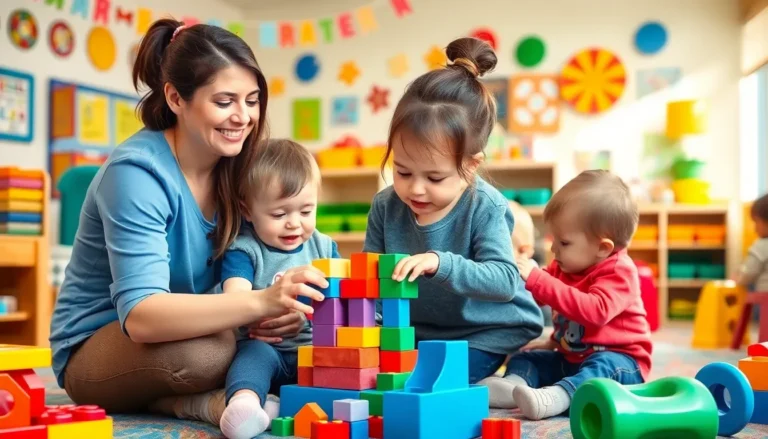Video games are often hailed as the ultimate escape for kids, but what happens when that escape turns into a trap? While they might seem harmless, an overindulgence in gaming can lead to some serious side effects on child development. Imagine a child who can conquer virtual worlds but struggles to navigate real-life social situations. It’s a bit like being a wizard in a fantasy realm but a mere muggle at the dinner table.
As parents and caregivers dive into the digital age, it’s crucial to understand the potential pitfalls lurking behind those flashy graphics and addictive gameplay. From diminished attention spans to social isolation, the negative effects of video games can sneak up faster than a stealthy ninja. So, let’s explore how these pixelated adventures might be shaping our little ones in ways we never imagined.
Table of Contents
ToggleOverview of Video Games and Child Development
Video games play a significant role in modern childhood, influencing cognitive and social development. Exposure to gaming environments can improve certain skills like problem-solving and multitasking. Yet, excessive gaming often leads to negative consequences that can hinder emotional and social growth.
Research indicates that prolonged gaming sessions may contribute to decreased attention spans in children. Reports reveal a correlation between high gaming time and increased rates of anxiety and depression. Social isolation becomes prevalent when children choose virtual interactions over real-world relationships. Many kids miss out on essential social cues and communication skills, which are fundamental to healthy development.
Parents and caregivers should recognize these negative aspects while assessing their children’s gaming habits. Limitations on screen time can help mitigate the adverse effects of video games. Not all games promote positive engagement; therefore, selecting age-appropriate content becomes critical. Interactive games that encourage teamwork can foster social skills, while violent games may exacerbate aggressive behaviors.
Clear guidelines regarding gaming duration and content can benefit children’s overall growth. Encouragement of balanced activities outside gaming, such as physical exercise and face-to-face play, aids in developing vital life skills. Understanding the distinction between beneficial and harmful gaming experiences allows adults to guide children effectively in their digital interactions.
Psychological Impact

Video games can significantly influence children’s psychological well-being. Understanding these impacts is crucial for parents and caregivers.
Increased Aggression and Violence
Exposure to violent video games correlates with heightened aggression in children. Research indicates that frequent gameplay can desensitize young players to violence. Players may imitate harmful behaviors they witness on screen. This imitation can manifest in various ways, such as increased bullying or physical fights. Studies show that children engaged in violent gaming often display more hostile attitudes compared to peers. Moreover, they may struggle with empathy and compassion, finding it challenging to relate to others’ feelings. Consequently, it becomes essential for parents to monitor game content and discuss its implications with children to mitigate these effects.
Social Withdrawal and Isolation
Spending excessive time on video games can lead to social withdrawal in children. Many prefer virtual interactions, which limits their engagement in real-life social situations. This preference makes it difficult for them to form meaningful relationships outside the gaming world. Evidence points to increased feelings of loneliness among those who game excessively. Social skills such as communication and teamwork often decline in these children. Additionally, they may miss critical opportunities to develop essential life skills through face-to-face interactions. Setting boundaries on gaming time can encourage a healthier balance between virtual and real-life interactions.
Academic Performance
Video game usage significantly influences children’s academic performance. Excessive gameplay often correlates with negative outcomes in school-related activities.
Decreased Attention Span
Video games can contribute to decreased attention spans in children. Frequent exposure to fast-paced gaming environments conditions kids to expect constant stimulation. As a result, they struggle to concentrate on tasks that require prolonged focus, such as homework and studying. Research shows that children who spend more than two hours daily on video games exhibit noticeable declines in attention during classroom activities. This disengagement can hinder their understanding of core subjects like math and reading.
Poor Time Management Skills
Poor time management skills often arise from heavy gaming practices. Children engrossed in their virtual worlds may neglect important academic responsibilities. In turn, this neglect leads to procrastination and last-minute cramming for exams. A survey found that students who allocate excessive time to gaming frequently fail to meet deadlines for assignments. Furthermore, balancing schoolwork with entertainment becomes increasingly challenging, leaving little room for productive routines.
Physical Health Concerns
Video games can lead to various physical health issues in children. With extended gameplay, children often neglect physical activity, leading to a sedentary lifestyle.
Sedentary Lifestyle
A sedentary lifestyle contributes to obesity, as children spend long hours sitting while gaming. Heavier gaming schedules can result in reduced cardiovascular fitness. Additionally, limited physical movement may weaken muscles and bones, impacting overall health. Engaging in outdoor play and sports offers children essential exercise, promoting a healthier life balance. Parents can encourage movement by setting specific game time limits and planning active family outings.
Sleep Disruption
Sleep disruption occurs frequently among gamers, particularly when children play late into the night. Reduced sleep leads to daytime fatigue, affecting concentration and mood during school. Melatonin production can decrease due to blue light exposure from screens, making it harder to fall asleep. Improved sleep hygiene practices, like limiting screen time before bedtime, help restore healthy sleep patterns. Encouraging a consistent bedtime routine supports better sleep quality and overall development.
Emotional Well-Being
Video games can significantly affect children’s emotional well-being. Research indicates a strong correlation between excessive gaming and increased anxiety and depression in young players.
Anxiety and Depression
Children exposed to gaming for extended periods may experience heightened levels of anxiety. Frequent gaming can lead to feelings of isolation, particularly when virtual interactions replace real-life relationships. Players often become anxious when they’re unable to access their games, experiencing withdrawal-like symptoms. Clinical studies show that video game content, especially violent scenarios, can amplify depressive symptoms. The cycle of turning to gaming for relief often results in neglect of physical activities, worsening mental health outcomes.
Impact on Self-Esteem
Self-esteem can suffer due to immersive gaming experiences. Children may compare their achievements in games to their real-life successes, leading to feelings of inadequacy. In competitive gaming environments, some children might struggle with self-worth if they don’t excel, impacting their overall confidence. Continuous exposure to gaming has been linked to unrealistic expectations and disappointment when faced with real-world challenges. This diminishing self-image can hinder children’s willingness to engage in new activities, further exacerbating emotional difficulties.
Conclusion
Navigating the world of video games requires careful consideration. While gaming can offer certain cognitive benefits, the potential negative effects on child development cannot be ignored. Parents and caregivers play a crucial role in guiding children through their gaming experiences. By establishing boundaries and promoting a balanced lifestyle, they can help mitigate risks associated with excessive gaming.
Encouraging outdoor activities and fostering real-world social interactions are essential for healthy development. Understanding the impact of video games on children’s emotional and physical well-being is vital. With mindful engagement in gaming, children can enjoy the benefits while minimizing adverse effects on their growth and development.



